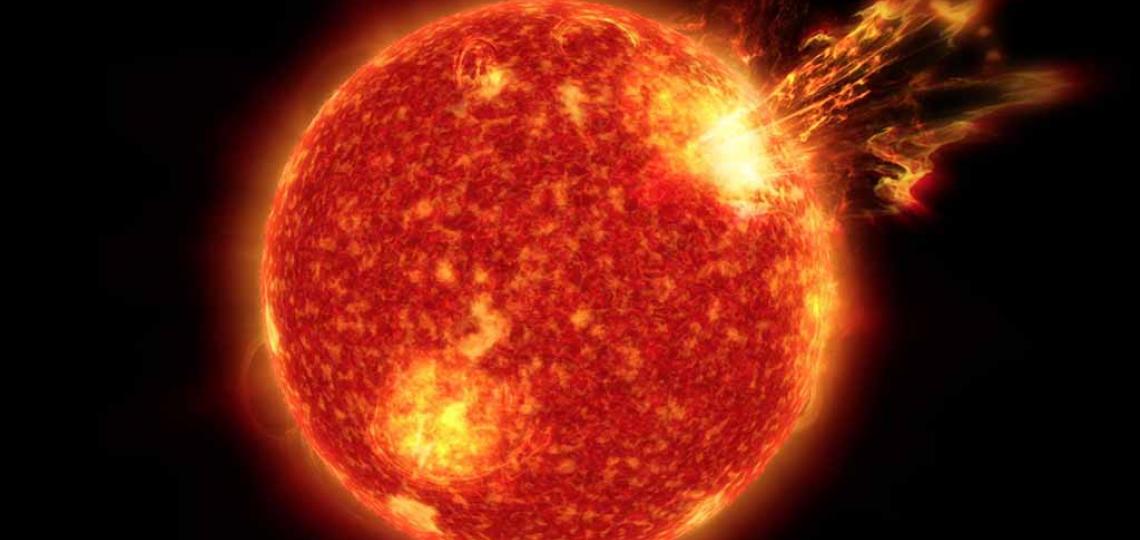Tackling Deep Space Radiation
Once outside of Earth's protective atmosphere, astronauts will be exposed to radiation from galactic cosmic rays and solar particle events. This space radiation will put astronauts at risk for radiation sickness, central nervous system effects, degenerative diseases, and a greater risk of developing cancer during their lifetime.
The Translational Research Institute for Space Health (TRISH) funds radiation research to protect astronauts from the risk of space radiation exposure during deep space exploration.
Current Radiation Research

Research: Using human stem-cell derived vascular, neural and cardiac 3D tissues to determine countermeasures for radiation
Institution: Johns Hopkins University, Baltimore, Maryland
Project Dates: Oct. 1, 2020 – Sept. 30, 2023
NASA Risk Addressed: Adverse cognitive or behavioral conditions, cardiovascular disease and other degenerative tissue effects from radiation exposure and secondary spaceflight stressors (BMed/Degen/CVD)
Project: Dr. Gerecht will examine 3D human tissue models for their response to radiation, with an eye to the development of countermeasures. Altered protein expression and changes in protein function may lead to genetic and proteomic interventions that target the most radiation affected sites, and signaling pathways might propagate these effects. The team is analyzing responses of three human tissue models to low-dose protracted GCR simulations and identify and develop countermeasures using optogenetics and molecular antagonists. The results will help to determine if complex human models can serve as an effective test bed for the effects of space radiation on intact humans, and will identify and assess possible countermeasures to these effects.

Research: Human multi-tissue platform to study effects of space radiation and countermeasures
Institution: Columbia University, New York City, New York
Project Dates: Oct. 1, 2020 – Dec. 31, 2023
NASA Risk Addressed: Adverse cognitive or behavioral conditions, cardiovascular disease and other degenerative tissue effects from radiation exposure and secondary spaceflight stressors (BMed/Degen/CVD)
Project: The exact effects of space radiation that crew will encounter during moon and Mars exploration are still uncertain. Dr. Vunjak-Novakovic is researching the effects and mechanisms of radiation on bone marrow (acute damage target), heart muscle (delayed damage target), liver (depo of granulocyte colony-stimulating factor (G-CSF)), and vascular perfusion with circulating cells. The team will test countermeasures against acute and fractionated high-linear energy transfer (LET) neutrons, simulated galactic cosmic rays, and photons (controls). The project is expected to deliver a radically new approach enabling studies of space radiation damage and countermeasures.

Research: Effects of chronic high LET radiation on the human heart
Institution: Colorado State University, Fort Collins, Colorado
Project Dates: Nov. 1, 2020 – Oct. 31, 2023
NASA Risk Addressed: Cardiovascular disease and other degenerative tissue effects from radiation exposure and secondary spaceflight stressors (Degen/CVD)
Project: Dr. Weil is designing and commissioning a facility that will expose engineered heart tissue (EHTs) to high linear energy transfer (LET) neutron radiation at low dose rate, nearly continuously, for more than a month. The facility will then be used to irradiate EHTs fabricated using human induced pluripotent stem cells (hiPSCs). The irradiated tissues will be screened for a panel of functional outcomes with known clinical relevance. This research is exploring new pathways to improve risk assessments for space radiation induced cardiovascular disease that may lead to methodologies for inflight detection for cardiac damage which, in turn, will inform decisions on whether countermeasures should be administered to individual crew members, and lead to the identification of those countermeasures.
Previously Funded Investigations

Research: A mechanistic framework to assess the efficacy of aspirin and other radioprotectors to reduce carcinogenesis by space radiations.
Mentor: David Brenner, Ph.D.
Institution: Columbia University, New York, N.Y.
Start Date: Jan. 1, 2018
End Date: May 31, 2019
Study Type: Ground study
NASA Risk Addressed: Space Radiation Exposure (Cancer)
Project: Astronauts are exposed to a variety of ionizing radiations that present health risks, such as a very likely increased, but not yet quantified, risk of cancer. The nature of the exposure to radiation in space is fundamentally different from that on Earth and so can be the triggered biological responses. By combining mathematical models with quantities that characterize the interaction of different types of radiation with biological tissues at the cellular scale, Dr. Cunha describes data from experiments that evaluate the impact of radioprotective compounds on space-radiation-induced carcinogenesis. The goal is to extract information about the biological mechanisms involved in cancer development in the space radiation environment. This research will provide clues about what biological pathways could be targeted to provide effective protection against space radiation hazards, while paving the way to more accurate predictions of cancer risks for astronauts.

Research: Mining biology's extremes for new space radiation resistance strategies
Institution: Duke University, Durham, N.C.
Start date: Oct. 1, 2017
End date: Jan. 31, 2020
Grant Mechanism: Single PI grant
Study type: Ground study
NASA Risk Addressed: Risk of Acute (In-flight) and Late Central Nervous System Effects from Radiation Exposure, Risk of Cardiovascular Disease and Other Degenerative Tissue Effects From Radiation Exposure and Secondary Spaceflight Stressors
Project: Astronauts are exposed to higher levels of harmful radiation in space than on Earth. Exposure to radiation can lead to cancer, immune disorders, and other biological complications. Therefore, it will be imperative to protect crew from the harmful effects of prolonged exposure. To that end, Dr. Fox is studying two highly radiation resistance model organisms—tardigrades (water bears) and Drosophila fruit flies (hind gut)—to identify unique genes that enhance radiation resistance.

Research: Impact of Radiation Exposure on a 3D In Vitro Model of Human Bone Marrow
Institution: University of California, Davis
Start date: June 1, 2019
End date: Aug. 31, 2020
Grant Mechanism: Focused Investigation Project (FIP)
Study type: Ground study
NASA Risk Addressed: Radiation exposure for astronauts on deep space missions
Project: The project aims to characterize the impact of acute ionizing radiation on the health and function of a human bone marrow using a microphysiological system model of human marrow (“bone marrow-on-a-chip” or BMoaC). The significance of this project is derived from the unique and potentially dangerous levels of ionizing radiation exposure for astronauts on deep space missions, and the highly radio-sensitive features of human bone marrow, in particular the hematopoietic stem cell. Recent reports in simple monolayer culture systems suggest that both the hematopoietic stem cells (HSCs) and the supporting stromal cells (e.g., mesenchymal stem cell, MSC) are acutely affected by ionizing radiation that not only disrupts hematopoiesis, but also increases the incidence of leukemias.

Research: Human-centered Design Augmentation of the Vertical Flow Paper-based Health Monitoring Platform
Institution: University of Arizona, Tucson, Ariz.
Start Date: March 1, 2019
End Date: Feb. 29, 2020
TRISH Synergy Project: PI Frederic Zenhausern
Study Type: Ground Study
NASA Risk Addressed: HSID
Problem Addressed:
Major Aim of Project: To augment the current TRISH VFP project (PI Frederic Zenhausern) through a human-centered design working in microgravity, including sample preparation modules for gene expression based health monitoring, that will be housed inside the CubeLabsfrom Space Tango.

Research: Silk Composite Biomaterials for Shielding Medications in Space
Institution: Tufts University, Medford, Mass.
Start date: Jan. 1, 2019
End date: Dec. 31, 2020
Grant Mechanism: Single PI grant
Study type: Ground study
NASA Risk Addressed: Stability
Project: The medications needed to keep a crew healthy during a deep space exploration mission must remain effective while enduring more than a year in deep space, which includes exposure to space radiation. Medications must be stored in containers that are resilient to such conditions, which is the goal for Dr. Kaplan’s project of using silk protein composite materials to protect these compounds. Silk protein is a US Food and Drug Administration approved biomaterial. Formulations including silk proteins will be used with inorganic particles to shield a variety of drugs from exposure to environmental extremes. The protective ability of the materials and mechanisms will be explored through a combination of testing and molecular modeling.

Research: Organs on a Chip' Platform for Assessing Cosmic Radiation Damage
Institution: Columbia University, New York, NY
Start date: June 1, 2019
End date: May 31, 2020
Grant Mechanism: Focused Investigation Project (FIP)
Study type: Ground study
NASA Risk Addressed: Degen/ CVD
Project: This project will implement a novel “organs on a chip” platform to investigate the effects, mechanisms, and protective measures related to cosmic radiation. Human tissues will be bioengineered from induced pluripotent stem cells (iPS cells), matured, physiologically connected by vascular perfusion containing immune cells, and subjected to space radiation and simulated microgravity, separately or simultaneously.

Research: Development of a Vertical Flow paper-based Platform (VFP) for Monitoring Health Outcomes in Inflight Condition
Institution: University of Arizona College of Medicine, Phoenix, Ariz.
Start Date: May 1, 2018
End Date: April 30, 2019
TRISH Synergy Project: Novel Microfluidic Biomarker Detection Platforms to Monitor In Vivo Effects of Solar Particle Events and Galactic Cosmic Rays Radiation, Using Mice with Human Hematopoietic Systems
Study Type: Ground Study
NASA Risk Addressed: Medical
Problem Addressed: This project will design and characterize a novel Vertical Flow Paper-based Platform (VFP) built within a miniaturized “syringe-like” cartridge that will perform multiplexed detection of bio-agents and up to hundreds of biomarkers in small or large volumes of bodily fluids suitable for diagnosis in long space travel condition.
Major Aim of Project: This project will study bacterial agents (e.g., gut bacteria or other environmental exposure on the International Space Station-ISS), and also nucleic acid detection in order to develop a hybrid platform able to multiplex different types of biomarkers for enabling the diagnosis of multiple conditions.

Research: Use of Microbial Based Countermeasures to Mitigate Radiation Induced Intestinal Damage
Institution: Baylor College of Medicine, Houston, Texas
Project Dates: Oct. 1, 2020 – Sept. 30, 2022
NASA Risk Addressed: Adverse health effects due to host-microorganism interactions (Microhost)
Project: Very little is known about how exposure to space radiation might affect gastrointestinal health and function. The high turnover rate of the intestinal stem cell (ISC) predicts that the small intestine will be vulnerable to the effects of radiation exposure associated with long duration space flight. Dr. Blutt is researching human intestinal organoid (HIOs) cultures, which provide a new model system to examine the impacts of simulated space radiation on the ISC, identify biomarkers of small intestinal damage and repair following radiation exposure, and explore countermeasures to the damage. The results from this study will provide direct insights into the effects of simulated space radiation on the small intestinal epithelium and elucidate microbial countermeasures that facilitate epithelial renewal.

Research: Counteracting space radiation by targeting neurogenesis in a human brain organoid model
Institution: Baylor College of Medicine, Houston, Texas
Project Dates: Oct. 1, 2020 – Sept. 30, 2022
NASA Risk Addressed: Adverse cognitive or behavioral conditions (BMed)
Project: Neurogenesis, the generation of new neurons throughout life, is essential for formation of new spatial memory and mood control in the hippocampus. However, new neurons are formed from neural stem cells, which are very sensitive to all forms of radiation. If exposed, they die and therefore, neurogenesis declines which also leads to a decline in learning and memory as well as depression. Therefore, understanding this phenomenon in the context of space radiation is of utmost importance if we are to avoid at least some of the cognitive and mental health pathologies during space flight. Dr. Maletic-Savatic will examine neurogenesis in the human brain organoid models exposed to Linear Energy Transfer (LET) proton beam to mimic Galactic Cosmic Rays (GCR). The team will use two complementary cerebral organoid models and will expose them to the proton beam at the MD Anderson Proton Center at different time points and different frequency of exposure to examine molecular, metabolic, cellular, and physiological properties of the variety of cell types that are part of the neurogenic niche. This research focuses on neurogenesis as the only natural mechanism to regenerate lost brain tissue in vivo in the center for learning and memory and mood control.








 Credit
Credit
